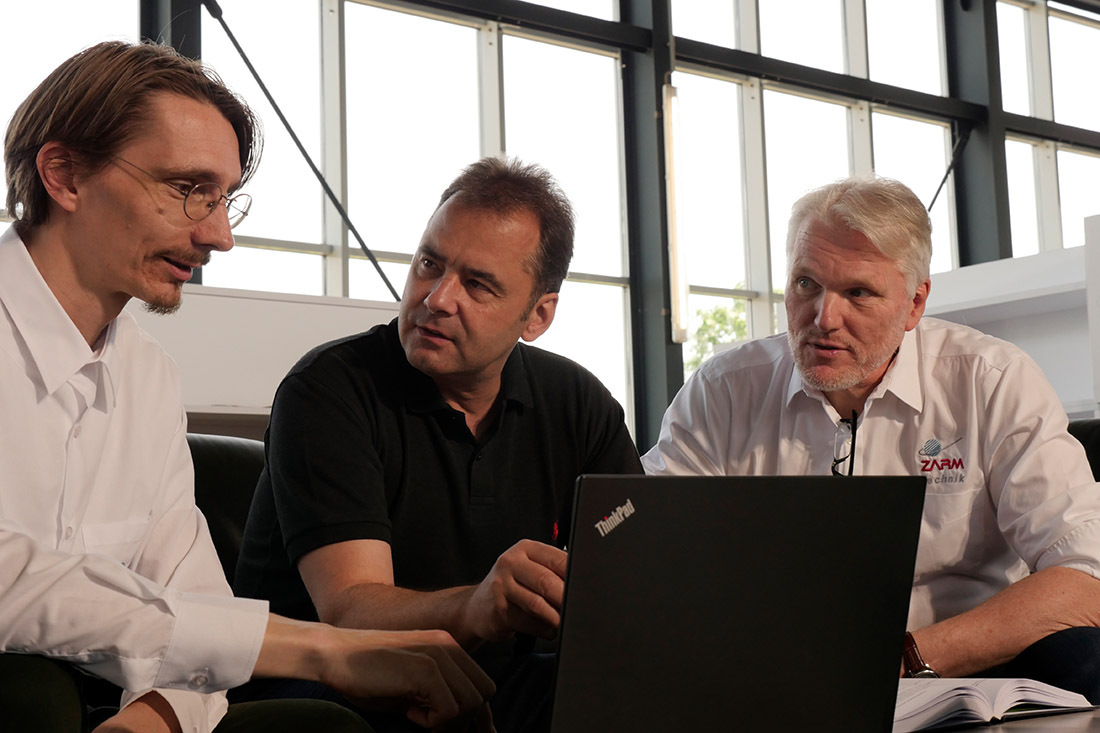Eight spin-offs from the science sector in Bremen
ScienceSpin-offs that carry expertise over into the economy

How do scientific findings enter our everyday lives? It is a long way from the laboratory to a saleable product. Sometimes, it is the scientists themselves who develop their research results, commercialise their ideas and establish companies.
A spin-off is the separation of a unit from an organization in order to continue it independently. In the context of science, spin-offs or spin-offs occur when employees of a university or institute use their research findings to build a company. This has several advantages: On the one hand, it is often not possible to set up optimal commercial operations in research structures - a university is not a factory. In addition, spin-offs are more interesting for funders and can be managed more easily. Even after the spin-off, contacts and collaborations between spin-off and science usually continue. In this context, founders can give up their scientific careers in the course of the spin-off, but also continue to pursue them in part-time models.
In the following article, we will introduce several spin-offs that were formed in Bremen and that have outgrown the start-up stage, for instance companies that have successfully operated on the market for at least five years.By the way: spin-offs from the science sector in Bremen can apply for support from the BRIDGE founders’ programme (German), run by the University of Bremen, and from Starthaus Bremen.
Eight science spin-offs from Bremen’s scientific landscape:
1. ZARM Technik AG

Rotating satellites in space without consuming fuel – ZARM Technik AG, based in Bremen, rank among the global aerospace elite thanks to their technical solutions. Satellite manufacturers from across the globe regularly reach out to them in Bremen. The company was founded in 1997 as a spin-off of ZARM – The Center of Applied Space Technology and Microgravity (German) – with whom the company still shares premises and knowledge to this day.
2. Encoway
In 2000, the dot-com bubble surrounding the hype of internet-based companies burst on the stock market and triggered a recession. It was precisely then when Christoph Ranze, a former research associate at the Bremen TZI (Center for Computing Technologies), set out to make his vision a reality: encoway (German). The company is a European market leader for digital configurators. These are systems enabling customers to configure a product online exactly as they wish. Ranze is also Head of Digital Business at the global Lenze Group, closely affiliated with encoway.
3. MeVis Medical Solutions AG
In 2007, several spin-offs of MEVIS, the Fraunhofer Institute for Digital Medicine, were combined to form MeVis Medical Solutions AG. This publicly listed company employs 140 members of staff. The company uses artificial intelligence and other technologies to develop practical software systems for image-based early detection, diagnostics and therapy.
4. Biolog Life Science Institute
The portfolio of Biolog Life Science Institute contains in excess of 800 molecules. They act as precursors and are employed in medications or research projects by medical and pharmaceutical companies and scientific institutes. The company was founded as a spin-off from Faculty 2 Biology/Chemistry of the University of Bremen. In addition to producing molecules, the company also conducts independent research on new chemical compounds for applications in the pharmaceutical industry.
5. Geo-engineering.org GmbH
If you are erecting a building, it is often advantageous to know the composition of the ground on which it will stand. Is the substrate stable? Geo-Engineering.org is a service provider that performs investigations, surveys, analyses and construction supervision during groundwork (German). One important mainstay of the company is the offshore industry. The company investigates the sea floor to find out where foundations for wind turbines can be constructed. Founder Tobias Mörz is also Professor of Marine Engineering Geology at the Center for Marine Environmental Sciences (MARUM)
6. Bremer Umweltinstitut GmbH
In 1992, the Bremer Umweltinstitut (Environmental Institute of Bremen) was formed from a research team of students and professors at the University of Bremen whose activities began in 1976. The company performs pollution monitoring and quality inspections of all kinds. For instance, the Bremen-based company inspects buildings for mould formation, fire damage and harmful substances in building materials, such as asbestos. They also test construction products, furniture, leather, textiles and dietary supplements to ensure that they comply with legal limits. Even though the name sounds like an academic institute, the company is an independent business. While also frequently collaborating with the scientific community on research projects.
7. Aimpulse Intelligent Systems
Automation and optimisation in the logistics sector – these are the priorities of Aimpulse (German). The small team based in the Bremen Technology Park is a spin-off from the University of Bremen. The IT specialists frequently contribute to research projects. For instance, they are currently developing an “ECG for machines”. This development will be used to monitor and optimise the service life of technical systems.
8. OTARIS Interactive Services
Otaris is a further spin-off from the Center for Computing Technologies (TZI) at the University of Bremen. The company is an IT service provider specialising in the areas of individual software, IT security, quality management and testing. They are mainly active in the market research, public health care, telecommunications, e-commerce and public administration sectors.
Success Stories
Medium-Sized Companies in Bremen Showcasing the Full Range of the Local Economy
Medium-sized companies form the backbone of Bremen’s economy. They create jobs and produce goods that are in demand worldwide. Here is a selection of ten businesses that illustrate the diversity of Bremen’s economic landscape.
Learn moreMeasure, Test, Inspect – 11 Examples of Precision Engineering from Bremen
Not many people could name a manufacturer of metrology and testing equipment, but without their products we would not have space probes, aircraft or medical equipment. And Bremen is home to a whole host of these specialist companies.
Learn more8 Bremen Companies involved in Mass Spectrometry
If you want to get down to the smallest building blocks of our world, you need mass spectrometers. And there are few places in the world where there is such a high concentration of specialists and manufacturing companies and suppliers in this sector as in Bremen.
Learn more
